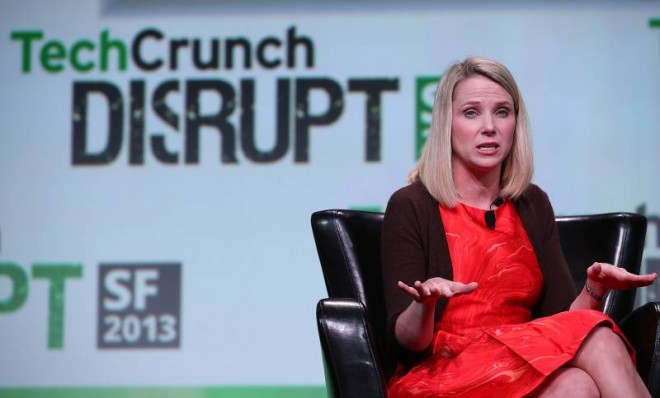The tech industry's sexism problem is only getting worse
Silicon Valley: Tomorrow's innovations, yesterday's views on women


Politics, it has been said, is a boys club. So too is the tech industry.
Silicon Valley's dude-centric ethos was put on display twice in the past few days in separate, extreme incidents that sparked immediate outcries against the sexist tendencies of the industry as a whole.
On Sunday, programmers at TechCrunch Disrupt — one of the preeminent industry conferences that serves as a showcase for emerging ideas and brands — unveiled a new app called Titstare. Created after an all-night hackathon, the app is, more or less, Instagram for breast-watching.
The Week
Escape your echo chamber. Get the facts behind the news, plus analysis from multiple perspectives.

Sign up for The Week's Free Newsletters
From our morning news briefing to a weekly Good News Newsletter, get the best of The Week delivered directly to your inbox.
From our morning news briefing to a weekly Good News Newsletter, get the best of The Week delivered directly to your inbox.
"Titstare is an app where you take photos of yourself staring at tits," Jethro Batts, one of the two Australian developers, told the audience.
After the event, TechCrunch issued an apology for "misogynistic presentations," and acknowledged that "sexism is a major problem in the tech industry."
Then on Tuesday, tech-heavy news site Business Insider fired its chief technology officer, Pax Dickinson, following a backlash against his questionable tweets about women, gays, rape, and minorities.
(Valleywag has a thorough roundup of some of the more offensive postings here.)
A free daily email with the biggest news stories of the day – and the best features from TheWeek.com
Within a day of Dickinson's tweets spreading across an outraged blogosphere, Business Insider cut ties with him.
"A Business Insider executive has made some comments on Twitter that do not reflect our values and have no place at our company," site co-founder Henry Blodget said in a statement. "The executive has left the company, effective immediately."
Combined, the two firestorms underscored what has long been known about the tech industry: It's dominated by men, and some are perfectly alright with that.
Dickinson's Twitter stream of unpopular opinions should not be considered some sort of aberration, because it is impossible to "scale the corporate ladder…without some sort of systemic acceptance," wrote Betabeat's Jessica Roy.
Mr. Dickinson doesn't exist in a vacuum: Until this morning, he had employees and coworkers and bosses, and yet somehow he's been allowed to spew hatred at every opportunity with only a meaningless Twitter bio qualifier protecting him: "Unprofessional opinions not endorsed by anyone respectable." This is a man who had hiring power at a major tech publication yet felt comfortable tweeting about his distaste for women and minorities, whose behavior has been implicitly condoned by the organization he represents. And we wonder why women and minorities are so underrepresented in tech? [Betabeat]
A host of other sexist incidents from across the industry bear out this point.
There was Donglegate, in which a female techie overheard, and subsequently posted about, two dudes discussing "dongles" as a sexual euphemism during a coding event. And there was the time a tech convention touted female wait staff as a perk — "Need another beer? Let one of our friendly (female) event staff get that for you." Or the time Geeklist put out an ad showing a woman dancing in her underwear with a Geeklist T-shirt.
The list goes on.
The problem is deeply rooted, going beyond casual acts of objectification.
Only three percent of all companies with venture capital backing have all-female founding teams; 89 percent have all-male leaders, according to the latest Silicon Valley Index. Fewer than 10 percent of tech startups have a female founder or leader. And women in Silicon Valley make only 49 cents for every dollar their male peers make, according to Measure of America.
"There exists in much of the tech startup scene the same juvenile attitude that exists in some hedge funds: That one's abilities or smarts makes one superior to others," Alexis Goldstein, a computer programmer and author, told Yahoo Finance. That attitude, she added, leads tech bros to believe "that you can treat women, or anyone seen as an outsider, however you like, without consequence."
Some in the tech community are starting to speak out about the dearth of women in the industry, and are calling on their colleagues to help squelch sexist attitudes in the field. Yahoo CEO and former Google exec Marissa Mayer lamented a few years back that the industry presents itself as almost uniformly male, immediately turning many women off to the field in the process.
"The number one most important thing we can do to increase the number of women in tech is to show a multiplicity of different role models," she said.
If only there was an app for that.
Jon Terbush is an associate editor at TheWeek.com covering politics, sports, and other things he finds interesting. He has previously written for Talking Points Memo, Raw Story, and Business Insider.
-
 5 highly hypocritical cartoons about the Second Amendment
5 highly hypocritical cartoons about the Second AmendmentCartoons Artists take on Kyle Rittenhouse, the blame game, and more
-
 ‘Ghost students’ are stealing millions in student aid
‘Ghost students’ are stealing millions in student aidIn the Spotlight AI has enabled the scam to spread into community colleges around the country
-
 A running list of everything Donald Trump’s administration, including the president, has said about his health
A running list of everything Donald Trump’s administration, including the president, has said about his healthIn Depth Some in the White House have claimed Trump has near-superhuman abilities
